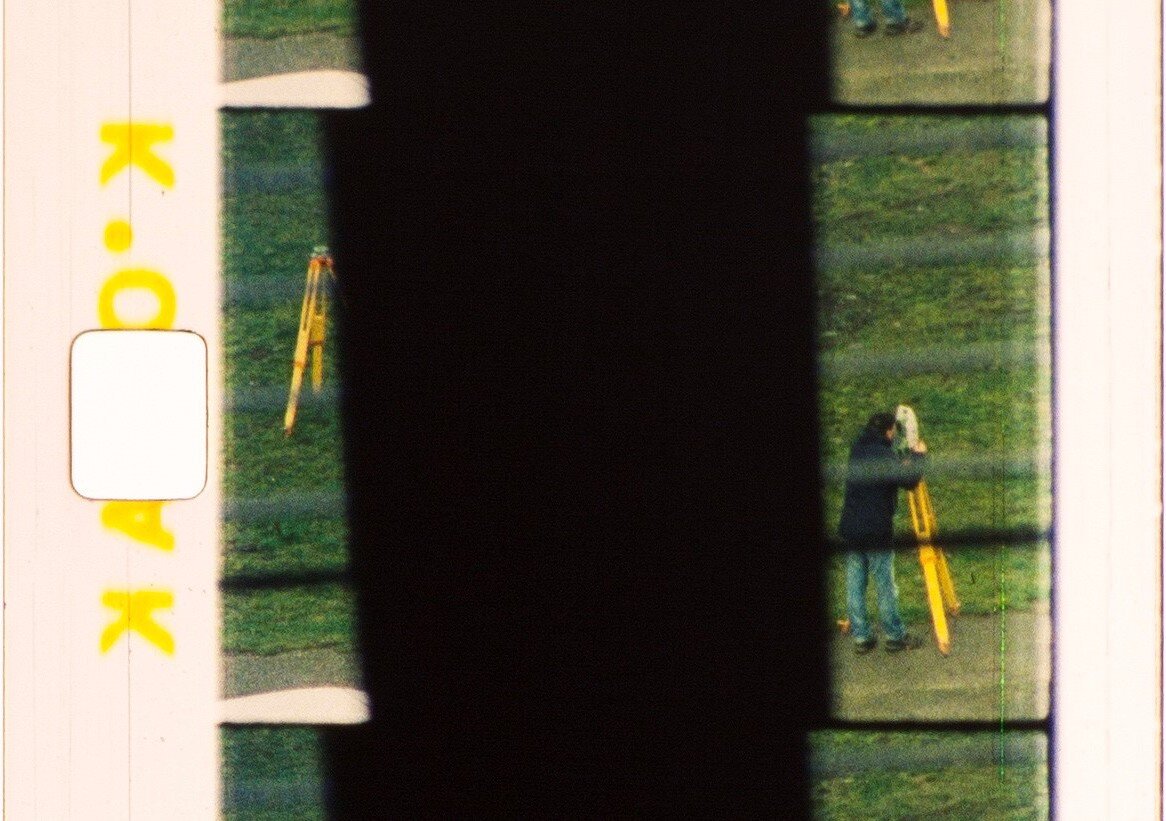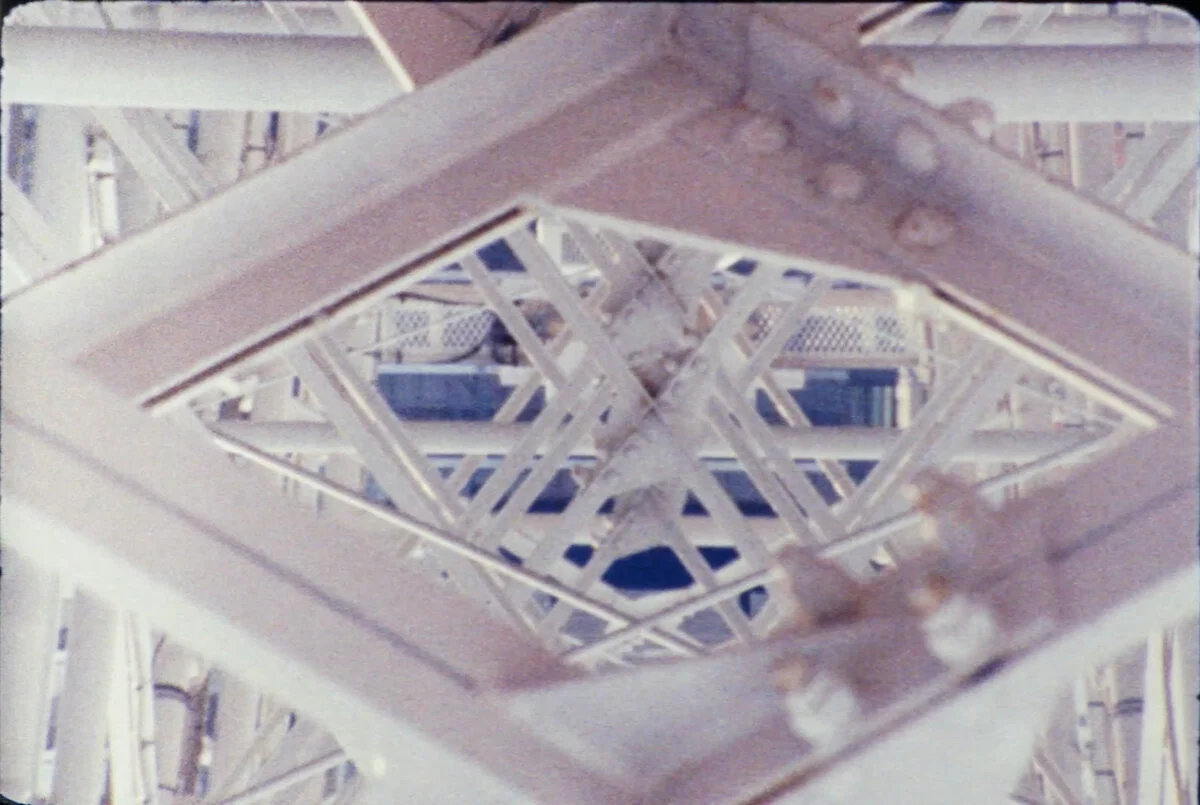Program 7
curated by Patricia Ledesma Villon
Sunday, March 15, 2020 @ 7pm
The Lab (2948 16th Street, SF, CA)
Total running time: 56 minutes
$6 - 10 sliding scale - tickets available at the door
Festival passes available for purchase here
An Architecture of Desire
1988 | 15 minutes | USA | 16mm | color | silent
I think of this film as one that led me very precisely through its composition. First, I was fascinated during the winter and spring in the "city of the dead" — Graceland — the graveyard containing magnificent, monumental, and some whimsical tombs, as final resting real estate for significant and wealthy Chicago families. Then I thought if I could really see closely with my lens, the surface of the skin of the human body, the barrier between the outside world and the living body; that I could touch the knowledge of what was inside, and unseeable. Of course I only met up with its limits. The next winter, I returned to Chaco Canyon, the ancient pueblos of the Anasazi (ancesters of the contemporary Hopi people). I filmed all day in the kivas. It had snowed, so I could not get out on the dirt roads, and was forced to spend the night there, in my car. I woke up suddenly, anxious, in the light of the full moon, to see a large black cat, like a panther, moving down the cliff, and coming directly toward me. He passed within five feet of me, and then moved away, toward the kivas. The next day, I read that Anasazi records speak of a race of black panthers, held sacred, and native to the area, but which have now been extinct for centuries.
-SD
Odds & Ends
Jane Conger Belson Shimané
1959 | 4 minutes | USA | 16mm | color | sound
Odds & Ends is a sly comment on the collage film and Beat culture. Strung together with doublespeak and non sequiturs, the monologue skirts the edge of nonsense as Henry Jacobs (credited via the anagram Rheny Bojacs) waxes on about poetry, jazz, “reaching the public,” “having a good time,” and—although “money doesn’t count”—the “possibility of subsidy” through grants. The visuals race on through dazzling transformations, both amplifying and undercutting the patter.
— National Film Preservation Foundation
Standing Forward Full
2019 | 6 minutes | USA | 16mm | color | sound
A helter skelter is an amusement ride with a spiral slide built around a tower. Like this film, an exorcism attempt of an unrequited desire, itʼs either moving too fast or at a complete standstill. Disorienting but exciting.
-AP
Locations
2019 | 7 minutes | Spain/Belgium | super 8 | color | sound
Conceived as a diptych, the first part consists of an unexposed old Super 8 magnetic-stripped Kodachrome Sound. In-camera recorded, a voice reads a text which describes what it is about to be seen in the second half. This text was written before the footage was processed in the attempt to remember what was seen through the viewfinder. The second half consists of a silent fresh Super 8 stock exposed to light. A sort of spot-the-difference between the verbal abstract description and the pictures, both halves take place at the same location. Voice by Polina Akhmetzyanova.
-BDR
Borgo
2019 | 4 minutes | France | 16mm | b&w | silent
Views of everyday life, Borgo Panigale, the road to the San Vitale Gate in Bologna and a breakaway: the Apeninns, Portivy. A tremor of the photographed landscapes go with the appearance and the disappearance of images seeking their frame.
-LL
El mar peinó a la orilla
2019 | 3 minutes | Spain | super 8 | color | silent
El mar peinó a la orilla (the sea combed the shore) tries to think of new geographies and play, from traces with altering the landscape filmed through brushstrokes that make the illusion that sky and sea come together, new ways from the film lens to erase the horizon or lift new landscapes.
-VAM
Fever
1998 | 6 minutes | USA | 16mm | color | sound
FEVER is a visually dense, poetic exploration of the bond between a mother and child and the interruption of illness. Inspired by the open creativity and free-association of children, extreme close-ups of quotidian objects, distorted "synchronous" sounds, and floating text intermesh to convey the fluctuation between security and danger, confidence and doubt when a child falls ill.
-PF
Amusement Ride
2019 | 6 minutes | Japan | 16mm | color | sound
Shot with a telephoto lens from inside a cabin of Cosmo Clock 21, a Ferris wheel at an amusement park in Yokohama, Japan. The distorted image shows the structure of the Ferris wheel, focusing on the intermittent vertical movement, which resembles the movement of a film at the gate of a film projector or camera.
-TN
Slow Volumes
2019 | 5 minutes | USA | 35mm | color | sound
A motion study of passing time. Shot using a hand-built camera, 35mm film is drawn past a thin vertical aperture, organizing the image temporally. Familiar objects dissolve into abstract lines unless in motion past the lens, their shape determined not by their physical features but in the speed of their movement.
-MG
Sandra Davis is a San Francisco-based experimental filmmaker and curator whose work has been exhibited at film showcases and festivals worldwide, including the Museum of Modern Art, New York; Museum of Modern Art, Pompidou Center, Paris. She has held teaching positions at the School of the Art Institute of Chicago, the University of South Florida, and the San Francisco Art Institute. She has lectured widely in the US and Europe on experimental cinema and its place within modern and contemporary art.
Jane Conger Belson Shimané was born in Missouri and studied at the San Francisco Art Institute. She married Jordan Belson, the University of California–trained painter who took up abstract animation and exhibited as part of the “Art in Cinema” series as early as 1947. Belson Shimané premiered her first film, Logos, in 1957, the same year that her husband created the “Vortex” light shows with sound artist Henry Jacobs. Featuring an electronic score by Jacobs, her animated work played at festivals in North America and Europe and toured Latin America through the United States Information Agency. Belson Shimané followed up with Odds & Ends and by 1960, had three more films under way.
Alee Peoples was born in 1981 in Oklahoma City. She maintains a varied artistic practice that involves screen-printing, sewing, sculpture and film. She is inspired by pedestrian histories, pop song lyrics and invested in the hand-made.
Bruno Delgado Ramo’s practice focuses mainly on the moving image, seeking to deal with materialistic site-specific cinema and to address the spatial conditions the cinematographic language and apparatus bring into play. Considering the room and its inherent architectural elements, like the window, as spatial devices, he aims to reveal their latent cinematographic aspects. He describes his work as research that is grounded in artistic practice, within which the idea of process is particularly relevant so he often conceives the film as the record of a process and both filming and screening as light-based processes at specific locations and contexts. Lately he has been working on Super 8 and at several picture and sound in-camera procedures it allows. His practice has led him to films, spatial and live proposals and printed matter.
Lucie Leszez was born in 1994. She began her doctoral research in cinema at Grenoble University (France) in 2018, is a member of the artist-run film labs l’Abominable and MTK, as well as a member of the review “La Revue Documentaires”.
Through a multidisciplinary artistic practice, Valentina Alvarado Matos explores the hybridization of the various plastic languages that she uses -collage, ceramics, photography and analog film- to elaborate discourses linked to memory and identity displayed in unfinished geographies. Her work establishes a dialogue where the poetic and the political are an important part of her artistic proposal. In 2016 she participated in the exhibition El pueblo - Searching for Contemporary Latin America at the Oberhausen Festival (Germany). Her film pieces have been presented at festivals such as S(8) Cinema Mostra Periférico, L'Alternativa, Antimatter Film Festival, International Film Festival Rotterdam, Festival Punto de Vista, among others.In early 2020 she travels to Canada as part of a film residence at Liaison of Independent Filmmakers of Toronto in collaboration with the S(8) festival and ACE Cultural.
Paula Froehle is an independent filmmaker working in Chicago. She has been making films for over ten years which have been funded both regionally (Illinois Art Council and Chicago Arts Council) and nationally (National Endowment for the Arts) and have screened/won awards at numerous festivals, including the Ann Arbor Film Festival, the London International Film Festival, the New Zealand Film Festivals, the Tampere International Film Festival, Finland, the Houston International Film Festival, the Mint Museum of Art, the Baltimore Art Museum and others.
In addition to her own films, she is an Assistant Professor at Columbia College, Chicago and has directed music videos and music-related films for Atavistic, a Chicago-based production company.
Tomonari Nishikawa’s films explore the idea of documenting situations/phenomena through a chosen medium and technique, often focusing on its process. His films have been screened internationally, and he is currently teaching in the Cinema Department at Binghamton University.
Mike Gibisser is a filmmaker interested in navigating the indefinite lines between essay, narrative, experimental, and documentary work. His films have screened at numerous festivals and venues including Wavelengths, Oberhausen, Ann Arbor, the Harvard Film Archive, and Projections / Views from the Avant-Garde. He lives in Milwaukee where he teaches in the Department of Film, Video, Animation, and New Genres at the University of Wisconsin-Milwaukee.









